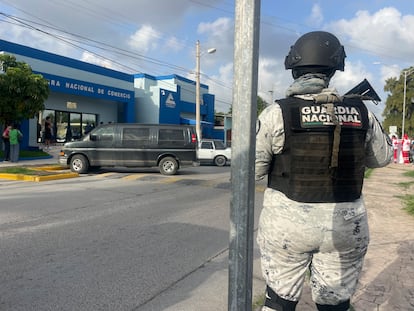When denouncing extortion gets you killed: Mexican business leaders in the crosshairs of organized crime
Julio César Almanza Armas was murdered hours after criticizing the insecurity faced by businesses in Tamaulipas. Weeks earlier, Minerva Pérez Castro was killed for the same reason in Baja California


Business leaders in Mexico are in the crosshairs of organized crime, which has diversified its business activities and now affects all links in the production chain: from agricultural activity to the distribution and sale of products. And those who speak out pay for it with their lives. Julio César Almanza Armas, the president of the Chamber of Commerce of the Mexican states of Tamaulipas and Matamoros, was killed on Tuesday afternoon after a dozen bullets were fired at his car’s window. His last public words have drawn attention: “Businesspeople are hostages of criminal gangs and extortion has practically become a national sport,” he said on Telediario Radio in Tampico.
On July 8, Minerva Pérez Castro, the leader of the Fishing Chamber of the state of Baja California, also dared to talk to the media about the need for greater security against illegal fishing and extortion. “They are selling products in the same markets, but they save on production costs. We need more surveillance on the coasts,” she said. Hours later, shots opened 16 holes in the windows of her van. Both Pérez Castro and Almanza Armas were at the doors of their offices when they were murdered.
On Tuesday morning, Almanza Armas was talking on the phone with Octavio de la Torre, the national president of the Confederation of Chambers of Commerce, Services and Tourism (Concanaco). The two discussed the violence, crime and extortion faced by businesses in Tamaulipas — the same problems that at the root of the business leader’s murder.
Businesses in Tamaulipas began complaining following the closure of all OXXO convenience stores and gas stations in the city of Nuevo Laredo, on the northern border of Mexico. In total, 191 stores and seven gas stations lowered the shutters last Friday and will not open until the necessary security conditions are met. Before he was shot, Almanza Armas — who was also vice president of Strategic Binational Affairs on the Borders of Concanaco — spoke out about the closures to the media. “Just a few hours after speaking to him, he was taken away from us,” De la Torre told EL PAÍS by phone on Wednesday.
Tamaulipas is the northern state closest to Central America. In other words, it is the shortest route for the thousands of migrants who cross Mexico in the hopes of reaching the U.S. border. As a result, human trafficking and extortion has become a lucrative business for organized crime. What’s more, Tamaulipas is the Mexican state with the highest number of border crossings — 17 in total.
At these crossings, all kinds of goods, legal and illegal, are taken into the United States in a multimillion-dollar trafficking network controlled by force. The fearsome Zetas and the Gulf Cartel — predecessors of the current Northeast Cartel — extort businesspeople in Tamaulipas, charging them a piso, an illegal tax for permission to carry out their commercial activity. “The Northeast Cartel has cells that are out of control,” explains Raul Benitez Manaut, a UNAM researcher and security expert. “Businessmen have no choice but to collaborate.”

Almanza Armas was aware of the problem, and had been fighting against the insecurity faced by commercial establishments for some time. Today, his last words are echoed by Darío Mercado, vice president of Concanaco, who was on his way to Tamaulipas on Wednesday. “In the last 20 years, crime has not stopped growing in Tamaulipas. Where before they controlled drug and human trafficking, now they are seeking to permeate the value chains and are becoming criminal monopolies of legal activities,” he explains by phone. Mercado is referring not only to the primary sector — agriculture —, but also to commercial markets such as chicken shops. “They force merchants to supply their products at the price they want and under their conditions.”
This is happening across practically all of Mexico, but Tamaulipas is a big market for the cartels. “In Nuevo Laredo and Reynosa, they have focused more on smuggling huachicol [pirated gasoline] at the border, and in other parts of the country, they already control construction materials. Six months ago, we detected that the cartels wanted to extend this business to Matamoros, we were trying to stop it,” says Mercado, who adds that he and Almanza Armas were working with the Attorney General’s Office to stop the cartels from gaining control of the construction materials industry.
Then OXXO decided to shut all its stores and gas stations in Nuevo Laredo, and Almanza Armas was killed in Matamoros. “The illegal tax affects all levels of the commercial chain,” says Mercado, from avocados to buying a car in the United States that has crossed the border illegally. “In the Tamaulipas area, everything is permeated by crime, and each border has its particular phenomenon.” The word drug trafficking has become too small to describe the activities of the cartels. It affects fishing in Baja California, avocados in Michoacán, chicken shops in Guerrero and street markets in Mexico City. Meanwhile, in the south, violent crime continues to wreak havoc in Chiapas.
Mexico’s authorities are trying to address the problem. The governor of Tamaulipas, Américo Villarreal, offered his condolences to the family of Almanza Armas. And promises have been made that everything possible will be done to find his murderers and lock them up, which rarely happens in Mexico. Tamaulipas security spokesperson, Jorge Cuéllar, called on OXXOs to report crimes as soon as possible. He told the media that this is the only way that the state prosecutors can operate properly.
The president of Concanaco, Octavio de la Torre, told EL PAÍS: “We are seeking the reform of the Penal Code because normally the victim is required to report [a crime], and that is re-victimizing. This has already made progress in the State of Mexico, where we have managed to start investigations ex officio.” In Mexico, a country wracked by fear of organized crime, filing a report is no small feat. “We are concerned, yes, these issues spark fear,” says De la Torre. He acknowledged the work of state governments in combating insecurity and violence, but hoped that efforts in this area would be redoubled.
Concanaco is “the oldest in Mexico, it is 108 years old and is currently present in 1,857 municipalities throughout the country,” says De la Torre “Ninety percent of our members are small, family-run businesses, with no more than five people in many cases,” explains the president of Concanaco. These are the people who are being affected by crime. “We are calling for security for citizens because that is essential for the development of the community,” he says.
Mexico’s development is currently focused on nearshoring: the relocation of foreign companies, mainly American, to the Mexican side of the border, where production costs are lower. This relocation is expected to bring a large number of jobs and lead to better social welfare in many states. But where there is business, there is crime, which, according to many experts, is more organized than governments.
“In recent months, there has been a diversification of illicit criminal activities, particularly in the dispute over border customs for the transfer of huachicol and the control of mines,” the Lantia Intelligence firm in April states in its monthly report on violence and criminal gangs. “This phenomenon is a cause for concern, since it does not guarantee economically reliable territories for foreign investment in the context of the relocation of production chains.” Cartel violence also leads to internal displacement, as seen in Chiapas and Nuevo León, two examples listed by Lantia Intelligence.
In Tamaulipas, the cities of Nuevo Laredo, Guerrero, Mier, Miguel Alemán, Díaz Ordaz, Reynosa, Río Bravo and Matamoros are on alert, according to the report. The document states that the “key players” in the state are the Northeast Cartel and the Jalisco New Generation Cartel (CJNG), as well as Los Escorpiones and Los Metros. Like a thousand-headed serpent, crime is branching out in all directions. “It is likely that some organizations will finance themselves in these new illicit markets in an attempt to challenge the Northeast Cartel, something that could happen in the medium term,” says Lantia Intelligence.
Business leader De la Torre hopes that justice will be done and is hopeful about the negotiations with Mexican authorities to increase security for businesses across the country. “Julio was loved and admired by everyone in the Concanaco, his father was also from this organization. He has left a widow and several children, now we are seeing how we take care of the needs they present. We are just good citizens”
Sign up for our weekly newsletter to get more English-language news coverage from EL PAÍS USA Edition
Tu suscripción se está usando en otro dispositivo
¿Quieres añadir otro usuario a tu suscripción?
Si continúas leyendo en este dispositivo, no se podrá leer en el otro.
FlechaTu suscripción se está usando en otro dispositivo y solo puedes acceder a EL PAÍS desde un dispositivo a la vez.
Si quieres compartir tu cuenta, cambia tu suscripción a la modalidad Premium, así podrás añadir otro usuario. Cada uno accederá con su propia cuenta de email, lo que os permitirá personalizar vuestra experiencia en EL PAÍS.
¿Tienes una suscripción de empresa? Accede aquí para contratar más cuentas.
En el caso de no saber quién está usando tu cuenta, te recomendamos cambiar tu contraseña aquí.
Si decides continuar compartiendo tu cuenta, este mensaje se mostrará en tu dispositivo y en el de la otra persona que está usando tu cuenta de forma indefinida, afectando a tu experiencia de lectura. Puedes consultar aquí los términos y condiciones de la suscripción digital.








































